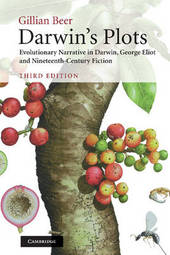
|
Darwin's Plots: Evolutionary Narrative in Darwin, George Eliot and Nineteenth-Century Fiction
Hardback
Main Details
| Title |
Darwin's Plots: Evolutionary Narrative in Darwin, George Eliot and Nineteenth-Century Fiction
|
| Authors and Contributors |
By (author) Gillian Beer
|
| Physical Properties |
| Format:Hardback | | Pages:330 | | Dimensions(mm): Height 229,Width 152 |
|
| Category/Genre | Literary studies - c 1800 to c 1900
Literary studies - fiction, novelists and prose writers |
|---|
| ISBN/Barcode |
9780521767699
|
| Classifications | Dewey:823.809 |
|---|
| Audience | | Professional & Vocational | |
|---|
| Edition |
3rd Revised edition
|
|
Publishing Details |
| Publisher |
Cambridge University Press
|
| Imprint |
Cambridge University Press
|
| Publication Date |
28 May 2009 |
| Publication Country |
United Kingdom
|
Description
Gillian Beer's classic Darwin's Plots, one of the most influential works of literary criticism and cultural history of the last quarter century, is here reissued in an updated edition to coincide with the anniversary of Darwin's birth and of the publication of The Origin of Species. Its focus on how writers, including George Eliot, Charles Kingsley and Thomas Hardy, responded to Darwin's discoveries and to his innovations in scientific language continues to open up new approaches to Darwin's thought and to its effects in the culture of his contemporaries. This third edition includes an important new essay that investigates Darwin's concern with consciousness across all forms of organic life. It demonstrates how this fascination persisted throughout his career and affected his methods and discoveries. With an updated bibliography reflecting recent work in the field, this book will retain its place at the heart of Victorian studies.
Author Biography
Gillian Beer is Emeritus Professor of English Literature at the University of Cambridge.
Reviews'Gillian Beer's superb study [is] a work of criticism that takes its modest place among the other 'cloudy triumphs' of English genius.' Michael Neve, Sunday Times 'Offers fresh insights into familiar themes in the history of science by dealing with them in quite a new way.' John Durant, The Times Literary Supplement 'The only problem with this book is deciding what to praise first. It draws on a breadth of knowledge in many fields, its literary readings are alert and original, it has a profound grasp of idea and form. It must be read by the scientist, the student of Victorian thought and art and the educated person in the street. ... The book is so exciting as a work of literary criticism - among much else - that it must provoke and disturb old interpretations and judgements.' Barbara Hardy, New Statesman
|